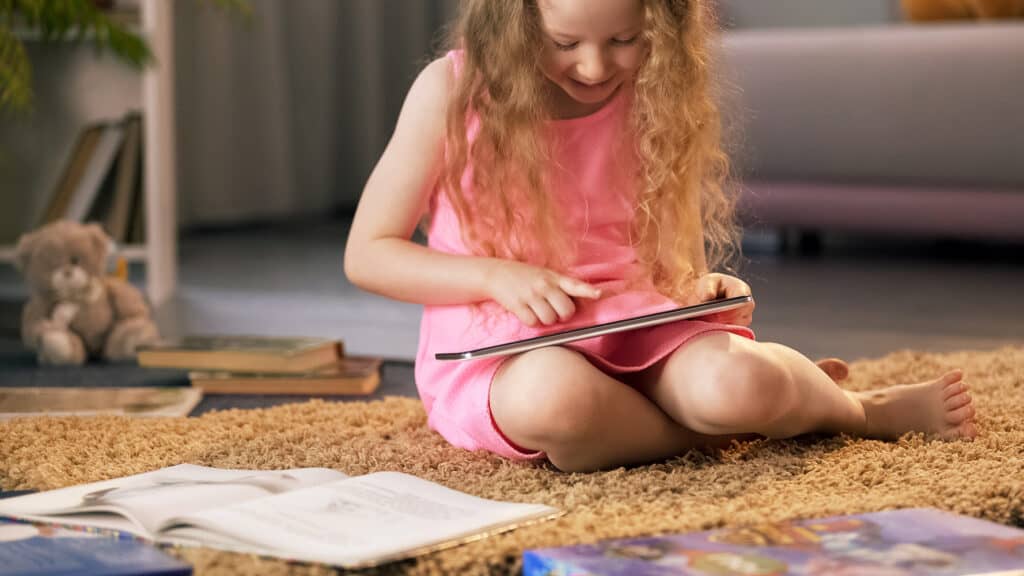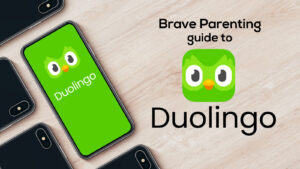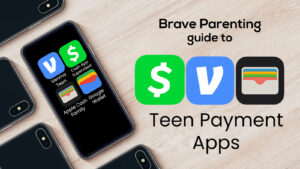Are children capable of fighting the temptation of the screen in order to read? If you want your child to read, however, gatekeeping screens is only half the battle.
Screen media is a serious temptation for kids (and parents to allow). We know this. But we also know that reading is a beneficial and critical skill that is declining among school-aged children.
In most homes, the battle is constant: Screens vs. Reading. Passive Entertainment vs. Mental Stimulation. Extrinsic Rewards vs. Intrinsic Growth. Screen Time seems unstoppable, like an undefeated champion that knocks out every contender: sleep, friendships, learning, and even personal responsibility.
But reading should not be a competitor in this arena at all. It is a standalone powerhouse, offering intellectual, emotional, and spiritual strength. Children should read regardless of screen time. Parents should read aloud regardless of digital alternatives.
Yet that is not what happens. Why? Because parents have been deceived into thinking these two must compete, or worse, collaborate, as in gamified reading apps that merge books with screens.
The Competition
Here’s what the competition looks like in the arena together: when both reading and screens are available, the battle is fought in the child’s heart and mind. Do they choose what is quiet, slow, and nourishing? Or what is loud, fast, and instantly gratifying?
Reading will lose. Not because it is weak, but because the child is unarmed for this fight. Children do not yet possess the self-control, vision, or maturity to choose the harder, better thing.
What makes it worse is that Big Tech sells the lie that children must use screens for learning, even reading. Parents buy into this, believing it prepares their child for the future. So they hand over devices, thinking they’re helping when, in reality, they’re placing their child in a battle they cannot win.
When a child becomes hooked on video games, obsessed with YouTube, or incapable of sitting quietly with their own thoughts, who takes the blame? Not the tech industry, not the app store. It falls on the parent who allowed it. Big Tech can push ideas and products all day long, but in the end, they are not gatekeepers – parents are!
Who Will Fight?
No one is more equipped or invested in a child’s thriving than the parent. Yet tech-optimism has convinced many that everything is better when powered by smart devices, touch screens, and AI.
Parents must challenge the lie that everything is better when it’s digital. Even if some things are better for adults, we must fight against this lie regarding children. The battle is not the same when the brain is not fully formed. Parents must remove this burden from their children and take up the fight themselves.
Whether it is Screens vs. Reading or Screens vs. Anything Else, parents must fight the battle for the child.
The fight is not between parents and kids or screen time and reading—it must be between parents and the screen.
Achieving a READING Victory
If parents are the ones who must fight the battle, they must also become trainers of readers, not just gatekeepers of screens.
Limiting screen time to a set number of hours per day is not enough. You must also build habits, environments, and desires that favor books over screens.
Here’s how you can fight for reading:
-
SET EXPECTATION TO ZERO SCREENS
We must set the expectation for zero daily screen time. Online apps and gaming platforms are designed to be addictive, and once they capture attention, they only require reinforcement to dominate their life. If we want readers, not screen addicts, we must cut off the battle before it begins. This isn’t to say there is always zero screen time, but there should be an expectation for zero.
-
ALLOW (EVEN TRY TO CREATE) BOREDOM
Boredom should be a staple of childhood. Boredom fosters curiosity, creativity, and reflection in real-time activities or through stories. Reading is one of the healthiest outlets for a child to “escape” their boredom. Don’t be fooled; screen media promises “escape,” but with the poison of algorithm-driven rewards, attention fragmentation, competition, and comparison.
-
LEAD BY EXAMPLE
Simple enough to say: if your children do not see you read for pure pleasure, they will be less likely to do it themselves. Instead of turning the TV on at night, curl up on the couch with a book and invite your kids to do the same! Bring a book with you when you know you’ll be waiting somewhere (doctor’s office, sports practice) so that you default to reading rather than scrolling.
-
CULTIVATE THE ENVIRONMENT
Children need an environment where screens do not serve as an ever-present temptation. If every room has a TV, consider removing one and replacing it with books. If that is too radical, start by designating one day of the week when the TV isn’t turned on and the room is open for read-aloud or personal reading. Set up a hammock or comfy lawn chairs in the yard where anyone can go to read. Also, children are known to stay up late reading. Don’t discourage this type of “rule-breaking”! Be sure they have a bedside reading light to make it easier.
-
READ ALOUD
Reading aloud to one child or the entire family is a great way to introduce harder books or new genres. It’s not only quality bonding time, but it also helps build children’s imagination, listening skills, vocabulary, and attention. Books that have been made into movies are a great option for reading aloud (C.S. Lewis’ The Chronicles of Narnia and Tolkien’s The Lord of the Rings are amazing options). Once the book is complete, celebrate by watching the movie together.
-
VISIT THE LIBRARY WEEKLY
Books can get expensive. Even with the ease of Amazon’s next-day delivery, healthy financial stewardship should lead families to utilize their local library more often. Plan to spend at least one hour every week. Let your kids browse freely, pick their own books (unless inappropriate), and associate reading with choice and freedom.
*Pro Tip: Keep the library receipt or request email receipts so books don’t go missing. -
MAKE IT FUN, NOT FORCED
A common mistake parents make is requiring reading as a task to be done before screen time is allowed. This sets up screen time as the ultimate goal and reward, and demotes reading to the ranks of washing the dishes. Establish reading as a privilege rather than a chore. Celebrate when books are finished! Ask questions with genuine interest so your kids see that books are worth sharing and reliving.
Developing a love for reading rarely happens by chance. It is a cultivated skill and passion that is either never developed or is lost due to the allure and addictiveness of screen media and entertainment. Therefore, parents must do battle to protect literacy. Children may not want you to fight for reading while young, but they will be so grateful that you did when they are older.
Check out our friends at Mud Hen Mama to shop for books that are pre-vetted to support and enrich the Christian worldview.

















